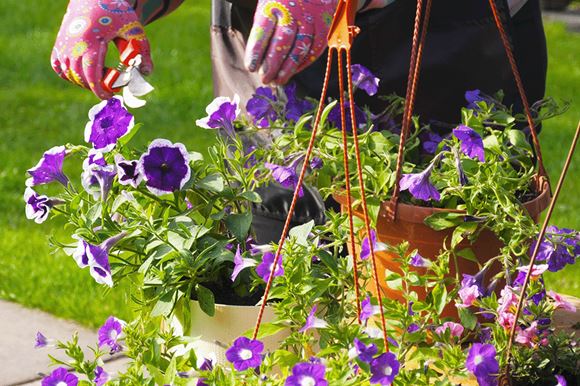
Pruning Container Garden Steps
By Kaw Valley Greenhouses, Inc.

Leggy plants are like awkward teenagers—tall, lanky, and kind of clumsy. To stop your leggy container garden plants from falling over and getting injured, use some strategic pruning to help them grow big and strong, and bloom beautifully. Here's a guide on identifying leggy plants in your container garden and the steps you can take to fix them.
How to Know When Your Leggy Garden Plants Need Pruning
Leggy plants typically develop from insufficient sunlight. They're desperate for more sun, so they instinctively grow tall to get closer to their light source instead of growing thick and spreading outward. Legginess can also result from too much fertilizer or soil severely lacking nutrients. If you're unsure if your container garden plants are developing correctly or if they're stretching for sun, look for these signs of legginess:
-
Long, pale green stems
-
Sparse blooms
-
Thin, limp foliage
A healthy, proportioned plant—or a formerly leggy plant that has undergone successful pruning—will exhibit the following characteristics:
-
Short, sturdy stems
-
Plentiful blooms
-
Lush, thick foliage
If your container garden plants are looking leggy and need some help, here’s what you can do to fix them.
 How Do You Fix Leggy Plants?
How Do You Fix Leggy Plants?
In addition to strategic pruning, you can take some additional steps to improve the future growth of your container garden plants. Follow these pruning tips and other best practices to help get your plants on the right track.
1. Trim back long stems above a node—a raised ridge along the stem where new branches can emerge. Use a pair of sharp, sterilized scissors or a similar small pruning tool; this will allow the stem to split into two new branches, which helps create density and promote thicker, voluminous growth.
2. Get your plant more light, if possible, so that they don't have to reach as far to get their daily dose of sunshine! If your growing space is located indoors, like a container garden, you can use grow lights. Place your grow light close to the plant for shorter, sturdier stems; this works especially well for herbs and filler plants. If you're relying on window light for your indoor container garden, move the pots to a super sunny South or West-facing window—lots of bright light will help strengthen your plants!
 3. Deadhead any spent blooms by snipping them off with clean scissors or pruners. It might seem counterintuitive, but this saves the plant's energy and lets it direct that fuel towards even more new growth! Cut them just above their leaves, and your plant will have plenty of room to sprout new stems and flowers.
3. Deadhead any spent blooms by snipping them off with clean scissors or pruners. It might seem counterintuitive, but this saves the plant's energy and lets it direct that fuel towards even more new growth! Cut them just above their leaves, and your plant will have plenty of room to sprout new stems and flowers.
4. Indoors you can add a fan to mimic a light breeze—it actually toughens up your plant, making them strong and stable! The wind encourages the plant to hunker down and grow sturdier rather than longer.
5. Avoid high nitrogen fertilizers, which cause plant foliage to grow much faster, but the growth will be thin and weak. Essentially, they're growing so fast that they don't have time to bulk up and get strong. Instead, use a balanced fertilizer with equal parts nitrogen, phosphorus, and potassium, so all the parts of your plant—leaves, stems, roots, and blooms—grow steadily and successfully. Always follow the instructions on your fertilizer label carefully to ensure you're applying the correct concentration. Too much fertilizer is a recipe for leggy container garden plants!
 Why Do Hanging Plants Get Leggy?
Why Do Hanging Plants Get Leggy?
Hanging container gardens can also get leggy—particularly trailing annuals like Petunias. Leggy petunias aren't necessarily unhealthy—they grow so fast and long that they look scraggly after a while. Don't be afraid to tidy up your hanging container garden plants. Just grab the snips and trim the vines below their nodes since they hang downward.
Our team at Kaw Valley are experts on garden trimming tips and more! You can keep up to date on the best garden tips by checking out our blog and following us on facebook.

Need some advice on how to start a beautiful garden? Sign up for our email newsletter, and receive free gardening articles, resources, and container designs to your inbox.
